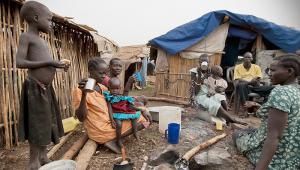Nadim Karkutli, manager of the European Union Trust Fund for the Syria Crisis, from the European Commission, was speaking at the annual AidEx conference in Brussels. This year, the event is focused on how to increase aid delivery by national and local organisations.
This localisation agenda has gained particular prominence within the aid community in the past year, largely because of its promotion at the first ever World Humanitarian Summit held in Turkey last May.
But, as many delegates have noted during this year’s AidEx, while the need to achieve localisation has achieved a broad consensus, that presents a variety of complex practical challenges.
Karkutli highlighted one of these from a donor perspective: donors need to respond quickly and with as big an impact as possible in a crisis. As a result, they will never be able to “select and manage hundreds of small organisations” to work with, especially when recipients need to be able to comply with transparency and accountability requirements.
“It would simply bring everything to a grinding halt. So we have to make very careful judgements. I’m not sure we need to do this in such situations, and I’m not sure we can do it.”
Karkutli added that instead, his fund tries to find ways to channel portions of financing to smaller organisations through its partners.
However, this echoes the current model of the humanitarian system: donor funds trickle down through structures like the United Nations and large, international NGOs to local groups, who implement projects on behalf of others rather than control them themselves.
This system is also inefficient. After every organisation has taken a cut for overheads along the way, very little is actually passed on to the end of the chain.
One answer would be to build the capacity of local groups so they are already in a position to respond – and perhaps even already have a relationship with donors – before an emergency strikes.
“As a big donor we need capacity in our partners,” Karkutli stressed, calling on international NGOs to work with local and national partners to build capacity.
Lana Wreikrat, senior emergency coordinator for UNICEF, noted that some of the organisations she works with in this way in Syria are getting ready to graduate to become a direct recipient of donor money.
In later sessions however, delegates said it can be difficult to secure donor funds for this kind of work.
They also called for national and local organisations, as well as affected communities, access to policy discussions and the decision making process. Inserting local actors into the system can inform humanitarian responses as well as give them greater agency, it was pointed out.













